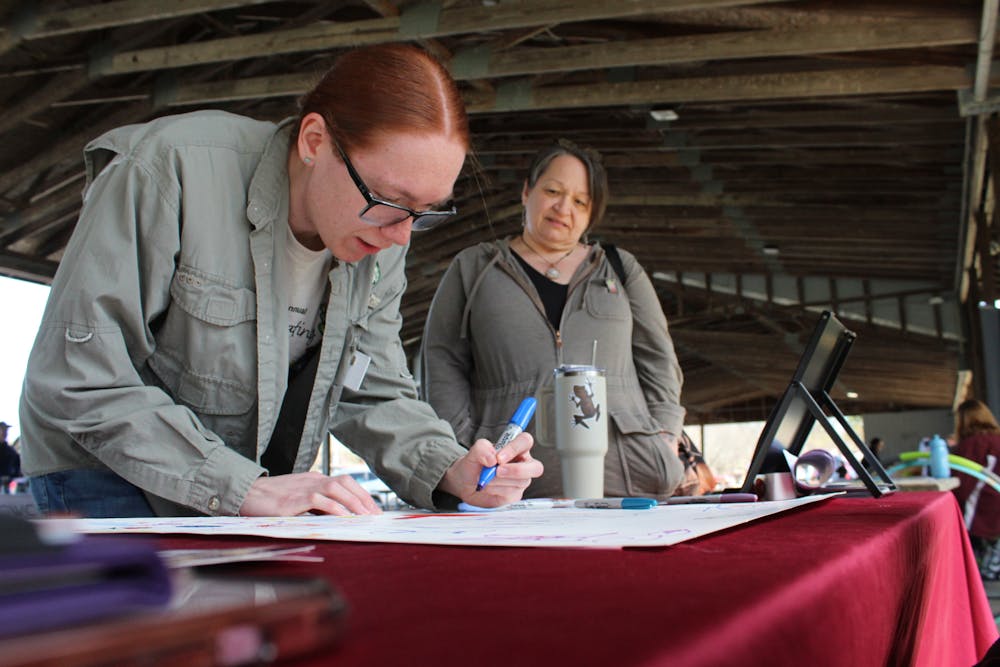Mount Pleasant celebrates Earth Day 2025

Debbie Peterson watches as her son, Mason Squillets-Peterson, adds to the poster at Central Sustainability's table at the 2025 Earth Day celebration at Island Park, Mount Pleasant on Tuesday, April 22, 2025. (CM Life | Cristin Coppess)
The sun shines brightly around Island Park’s south pavilion. A flurry of activity creates an organized chaos, with children bouncing around to different tables lining the perimeter, followed closely by the adults charged with overseeing them.
The smell of wood-fired pizza wafts through the park, enticing families and vendors to grab a bite to eat while enjoying the festivities. A representative from the DTE Energy company, dressed in a wind turbine mascot costume, poses for pictures with visitors.
The staff at the informational tables answer every rapid-fire question third grade students from Fancher Elementary throw at them, offering candy and other prizes to the young visitors. Others orchestrate craft time, encouraging kids to get creative with recycled cardboard, beads, pipe cleaners and other art supplies.
From 11 a.m. to 4 p.m. on April 22 in Island Park, Mount Pleasant community members, students and organizations gathered to celebrate Earth Day 2025 through outreach and education. Among them, Consumers Energy, Central Sustainability and Art Reach ran tables promoting kindness towards the earth and its inhabitants.
Maneula Powidayko, the Director of Planning and Community Development for the city of Mount Pleasant, said the event was part of an effort to build up organizations in the area and boost connectivity between them.
For many attendees, the celebration was more than just an educational opportunity. For some, it’s a tradition.
Debbie Peterson, a Mount Pleasant resident and employee of the Saginaw Chippewa Indian Tribe, showcased her passion for the planet as she navigated the tables and spoke with community members who also attended the event.
Peterson said she considers Earth Day to be just as important as more widley-celebrated holidays, such as Christmas. She has made a habit of taking the time to celebrate every year by volunteering in the community and attending Earth Day events.
“I took the day off from work because it’s not a holiday where I work, so I make it a holiday every year,” Peterson said. “I came out here just because I care about the earth. I care about how we are treating it. I care about reciprocity. She [the earth] cares about us, so I feel we need to be reciprocal in that.”
Being of Native heritage, Peterson said she has always felt a deep connection with the earth and the energy it gives off. That connection is something Peterson has ingrained into her son, Mason Squillets-Peterson, a coordinator for Central Sustainability at Central Michigan University.
“He and I always have a plan to do something for Earth Day,” Peterson said. "He grew up having that respect for the earth. Having tribal connection too, it’s in his blood, it’s in his DNA.”
Squillets-Peterson, along with his fellow coordinators, operated a table at the event in an effort to educate the community about sustainability.
“When people think of sustainability, they usually go to environmental stuff, which is very important, and you cannot forget about those," he said. “One of the things that CS likes to highlight is that there's way more to sustainability than just the environment.”
Squillets-Peterson said that CS wanted to promote the five pillars of sustainability: Cultural, social, human, economic and environmental sustainability.
“I’ve always been passionate about things related to sustainability,” he said. “Growing up, I always enjoyed nature. I’m also a Native Ojibwe from northern Wisconsin, so the environment is intrinsically tied to [my] identity as a native person. The basic principles of sustainability are already things that are taught and reinforced in most native cultures here. That’s probably where it came from, having that Indigenous background.”
He went on to emphasize the relevance of sustainability and environmental awareness to college students in particular, saying that the responsibility of sustaining the earth will soon fall on the next generation of professionals entering their career fields.
“Take the time to educate yourself and others about these issues,” Squillets-Peterson said. “People don’t know what they don’t know. So even just spreading awareness is just one thing we can do. Even a little thing you say here, like cultural sustainability, could get people thinking about things differently and enable them to make an impact.”



